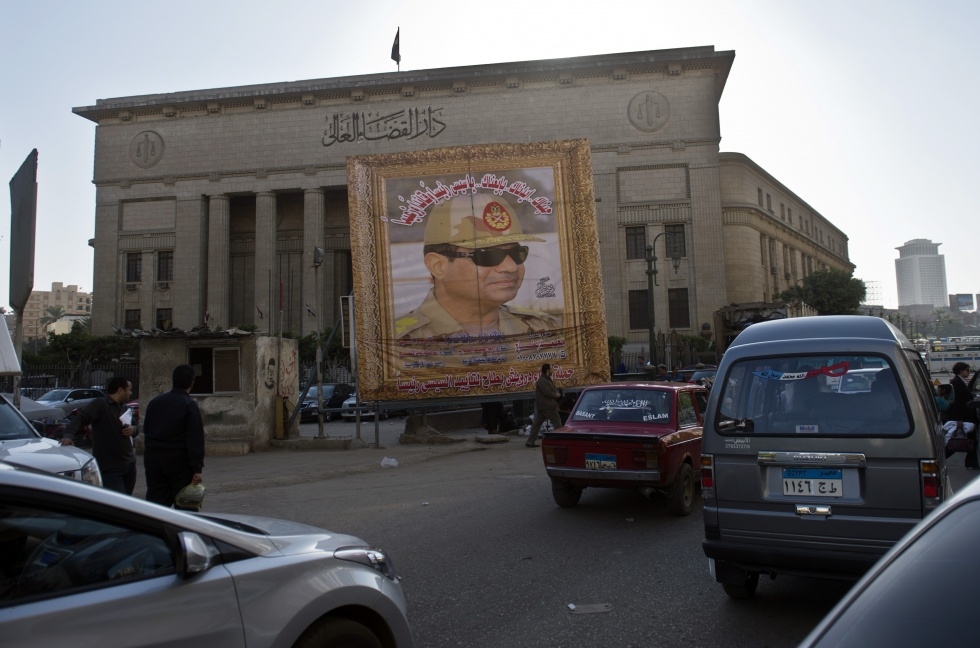Egypt court slammed for upholding prison terms for protest leaders

CAIRO - An Egyptian appeals court on Monday upheld three-year prison sentences for three prominent activists charged with violating a controversial law restricting protests.
The three, including the founder of the April 6 movement Ahmed Maher, rose to prominence in the 2011 uprising that toppled veteran strongman Hosni Mubarak.
The interim government installed after the army overthrew democratically elected president Mohamed Morsi in July jailed the activists for violating a law it had passed banning all but police-sanctioned protests.
Maher, Mohamed Adel and Ahmed Douma were charged with organising an unauthorised and violent protest in November, days after the passage of the law.
The sentencing in December of the activists, members of a broad coalition of groups that supported Morsi's ouster, had raised concerns of a return to Mubarak-era repression under the new military-installed regime.
Stay informed with MEE's newsletters
Sign up to get the latest alerts, insights and analysis, starting with Turkey Unpacked
The retired field marshal is expected to easily win the May 26-27 vote as he is riding a wave of popularity for ending Morsi's divisive year in power.
Militants have meanwhile unleashed a deadly campaign against security forces that has killed nearly 500 policemen and soldiers in bombings and shootings since last July.
Secular-leaning activists have increasingly been targeted in an extensive crackdown on the opposition, mainly Islamists, that has seen an estimated 15,000 people jailed.
Another prominent leftwing activist, Alaa Abdel Fattah, is standing trial on similar charges to those the trio faced.
Ahmed Seif, a lawyer for Maher and his co-defendants, said they will appeal the ruling and, if that fails, will take the case to the African Court of Human and People's Rights.
"There are no indications that the state is willing to loosen its grip," Seif told AFP after the ruling.
Human Rights Watch criticised Monday's verdict.
"Today's verdict against three of the most recognised faces of the January 25, 2011 protests is one more nail in the coffin for Egypt's revolution," Sarah Leah Whitson, HRW's director for the Middle East and North Africa, said in a statement.
And in Washington, State Department spokeswoman Jen Psaki said the United States was "deeply troubled" by the court decision.
"Their continued imprisonment under a law that severely restricts the universal right to peaceful assembly and expression runs counter the Egyptian Government's commitment to fostering an open electoral environment and a transition process that protects the universal rights of all Egyptians," she said.
"We urge the Egyptian Government to exercise its constitutional authority to commute these excessive sentences, which are not in line with the rights guaranteed in Egypt's new constitution, Egypt's international obligations, or the government's own commitment not to return to Mubarak-era practices."
Critics say the government has given police a free hand to clamp down on dissent, amid a crackdown that has seen more than 1,400 people killed in street clashes since Morsi's overthrow.
Courts have tried hundreds of Islamists en masse, with one court sentencing 529 to death for allegedly participating in a deadly riot.
Meanwhile, scores of Egyptian activists ended their sit-in outside the Ittihadiya presidential palace on Monday, giving a three-day ultimatum for interim President Adly Mansour to scrap an anti-protest law.
The activists said that they will stage a new sit-in if the interim President failed to scrap the anti-protest law – which requires police permission for staging demonstrations – and order an amnesty for three jailed prominent activists.
"If the presidency failed to respond, we will join hands with other revolutionary groups to stage an open-ended sit-in outside the presidential palace," Nourhan Hefzi, the wife of activist Ahmed Douma, said.
The government said last week it had boosted punishment for "terrorist" offences and expanded the scope of the crimes that fall under that category.
The legal amendments will come in force when Mansour approves the government-penned draft.
MEE + agencies
Middle East Eye delivers independent and unrivalled coverage and analysis of the Middle East, North Africa and beyond. To learn more about republishing this content and the associated fees, please fill out this form. More about MEE can be found here.

